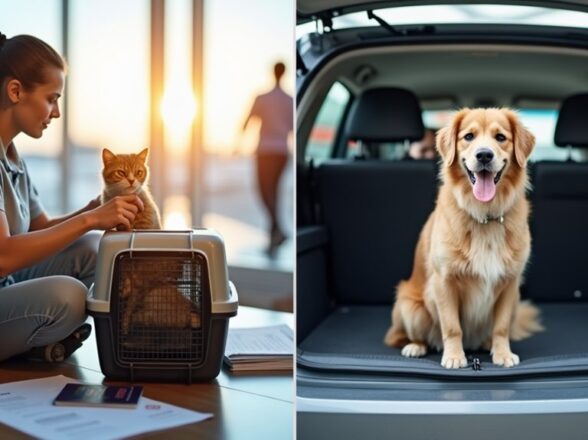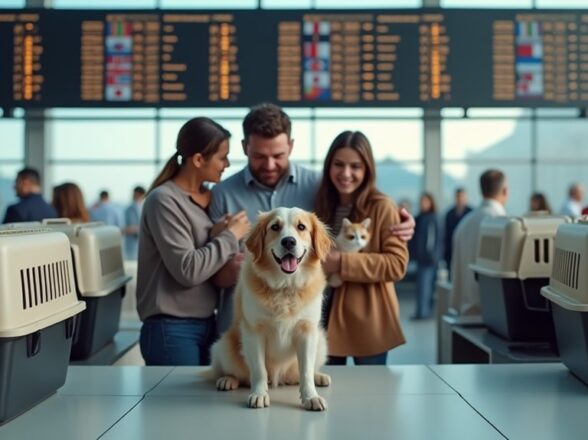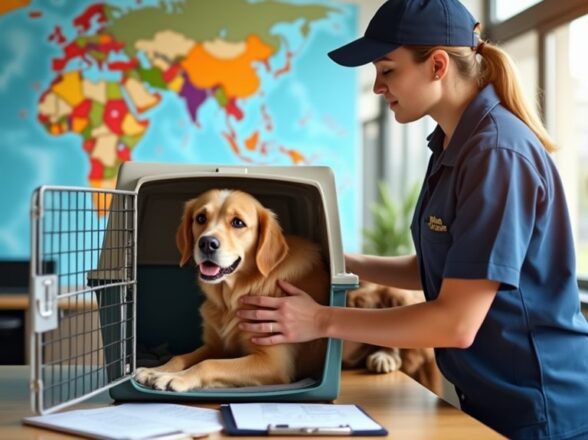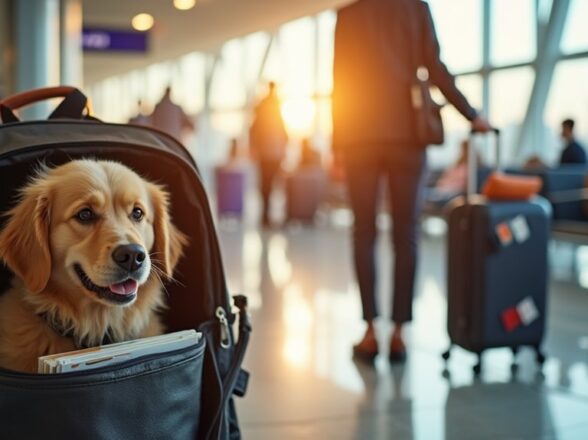What Are the Risks of Moving Pets Without Professional Help? Why DIY Pet Relocation Can Be Dangerous

Moving pets without professional help carries significant risks. You may face hidden costs and complex travel regulations. Pets can become anxious from noise and may suffer health issues from dehydration or extreme temperatures. Lack of appropriate paperwork might lead to delays or quarantine. Additionally, failure to address your pet's emotional needs can cause long-term behavior problems. Without emergency support, any travel disruption can become serious. Overall, while DIY relocation might seem cheaper, the potential dangers far outweigh the savings. Learn about effective solutions that guarantee your pet's safe journey and emotional well-being.
Common Misconceptions About DIY Pet Relocation

When considering a DIY pet relocation, what misconceptions might you be falling for? Many pet owners think it's cost-effective, but hidden expenses like health certificates and vaccinations can quickly add up. You might also believe your pet can travel safely in the cabin, but cabin noise can cause anxiety, making cargo travel a better option. Another common misconception is underestimating the complexity of international pet travel regulations. Without the necessary paperwork, you risk delays or refusal of entry. Additionally, not all airlines treat pets the same; some have stricter safety protocols. Professional services, like pet relocation companies, handle these issues efficiently, ensuring your pet's safety and comfort throughout the journey.
Legal Risks and Documentation Errors
When relocating your pet on your own, you might overlook important legal requirements. Each country has specific regulations regarding documentation, breed restrictions, and quarantine rules that you need to understand. Failing to meet these requirements can lead to fines or even prevent your pet from entering the destination country.
Documentation Compliance Challenges
Maneuvering the complex landscape of pet relocation can be overwhelming, especially when it comes to ensuring your documentation is compliant with destination regulations. Failing to research necessary documentation can lead to fines or delays. Common documentation compliance challenges include missing health certificates or vaccination records. Incomplete paperwork may result in legal issues during customs clearance.
| Documentation Type | Common Errors | Consequences |
|---|---|---|
| Health Certificates | Missing or outdated | Entry refusal |
| Vaccination Records | Incorrect dates | Fines or delays |
| Import Permits | Overlooked requirements | Legal complications |
Using professional services can help you navigate these import requirements and avoid costly mistakes. Don't leave your pet's travel to chance.
Breed Restrictions Awareness
Understanding breed restrictions is essential for a smooth pet relocation process since many countries and airlines impose specific regulations on certain breeds. You could face legal complications if you don't properly research these restrictions. Failing to comply with breed-specific laws might result in your pet being denied entry at customs, leading to quarantine or return. Documentation errors regarding breed specifications can delay travel and hinder compliance with international pet transport regulations. Some airlines require specific health certificates for certain breeds, and neglecting these can jeopardize your relocation efforts. Inadequate knowledge of breed restrictions may also lead to increased costs for unexpected transport arrangements or fines, making professional pet relocation services a safer choice for your move.
Quarantine Regulations Understanding
Steering through quarantine regulations can feel overwhelming, especially since each country enforces its own set of rules regarding pet entry. Failing to understand these regulations can lead to extended isolation for your pet, causing both emotional distress and added costs. Different countries have various rules, and non-compliance can result in fines or refusal of entry. Documentation errors, like missing health certificates or incorrect vaccination records, can also cause delays at customs. It's vital to research breed restrictions, as some breeds face stricter regulations or bans. Using professional pet relocation services guarantees all necessary documentation is completed accurately and in compliance with local laws, enhancing safety and easing the relocation process for you and your pet.
Health and Safety Concerns for Pets
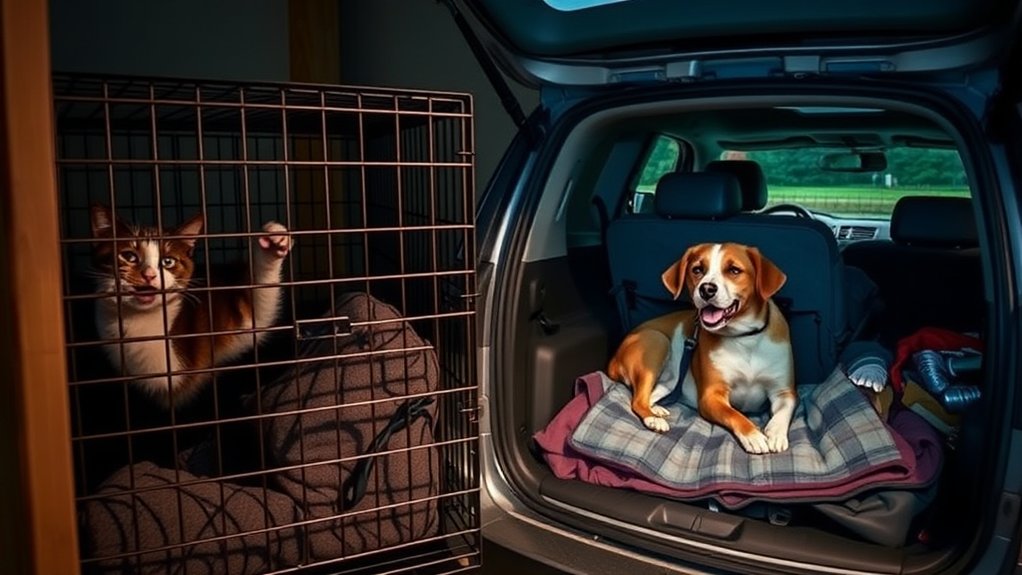
When you're relocating your pet, health and safety should be top priorities. Without proper planning, your pet could face health risks from inadequate vaccinations or stress during travel. Additionally, overlooking safety protocols can lead to unsafe conditions that compromise your pet's well-being throughout the journey. It's crucial to ensure vaccinations are current and discuss anxiety management with a veterinarian to mitigate stress during the move.
Health Risks During Travel
Traveling with your pet can be a challenging experience, especially considering the various health risks they may encounter along the way. Dehydration, stress, and exposure to extreme temperatures can all affect your pet's well-being. Professional pet relocation services provide temperature-controlled environments to help minimize these risks. Without proper vet checks and health certificates, your pet might face entry issues at borders, leading to quarantine or return, increasing stress. Additionally, improperly prepared pets may experience anxiety and potential injuries from panic attacks during transport. Certain breeds, like snub-nosed dogs, are more susceptible to respiratory issues, so careful planning is essential. Specialized pet movers offer trained personnel and secure transport options to ensure a safe journey for your pet. To protect your pet's health, consider expert assistance rather than DIY relocation.
Inadequate Preparation Consequences
Inadequate preparation for pet relocation can have serious consequences that directly impact their health and safety. If you opt for DIY pet relocation, it's essential to take into account the following risks:
- Health risks from exposure to extreme temperatures during travel.
- Failing to obtain necessary vaccinations can lead to delays or refusal at your destination.
- Increased anxiety if pets aren't acclimatized to their travel carriers.
- Lack of knowledge about airline regulations can expose pets to unsafe conditions.
Improperly secured pets may face significant injury risks while traveling. Without professional help, you might overlook these vital factors, putting your pet's well-being at risk. Confirm you're fully prepared to avoid these dangerous situations during your pets' travel. Hiring a professional service with comprehensive services can ensure a safer relocation for your pets.
Safety Protocols Oversight
While you might think DIY pet relocation is manageable, overlooking safety protocols can jeopardize your pet's health. Many pet owners fail to guarantee proper transportation conditions, leading to potential health risks. Without professional oversight, pets may travel in carriers with inadequate ventilation or temperature control, which are vital for their well-being. Additionally, mismanagement of required documentation, such as health certificates and import permits, can result in delays or refusal of entry at borders. Professionals are trained to recognize specific health concerns, especially for sensitive breeds. They make certain all precautions are taken for a stress-free relocation. Ignoring safety protocols can lead to severe incidents, including fatalities, making professional help essential for your pet's safety. Hiring pet relocation services ensures comprehensive handling of all aspects of your pet's move, from documentation to appropriate transportation arrangements, providing peace of mind and safety.
Emotional Impact on Pets During Travel
Although you may think your pet will adapt easily to travel, the emotional impact of relocation can be significant. Pets often face anxiety and stress during travel, especially in unfamiliar environments. Many DIY relocators overlook their emotional needs, which can lead to long-term behavioral issues.
Here are some important factors to take into account:
- Consistent routines can help reduce stress.
- Familiar items, like toys or bedding, offer comfort.
- Professional support techniques can alleviate anxiety.
- Acclimation to new environments is vital for adjustment.
Without professional help, you risk neglecting these aspects, making your pet's experience more difficult. Ensuring your pet's comfort during travel is essential for a smoother relocation process.
Lack of Emergency Support and Resources

When you choose to relocate your pet without professional help, you might find yourself lacking essential emergency support and resources. This lack of emergency support can make it hard to address health issues or accidents during travel. Many pet owners don't know the specific vaccination and health requirements for their destination, risking delays or entry refusals. In emergencies or travel disruptions, you may struggle to find veterinary care or pet boarding options, jeopardizing your pet's well-being. Additionally, unexpected situations like customs inspections can arise, adding stress to the process. Professional pet relocation services have established relationships with local veterinarians and emergency services, ensuring that necessary support is available when you need it most.
Benefits of Professional Pet Relocation Services
Relocating your pet can be a challenging task, especially without the right support. Professional pet relocation services offer several advantages that make the process easier and safer for you and your pet. They guarantee a smooth shift by handling all necessary documentation and complying with regulations. Here are a few key benefits:
- Personalized care tailored to your pet's unique needs
- Experienced staff trained in handling pets during transport
- Safe journey with temperature-controlled conditions
- Emergency support and contingency planning for peace of mind
Using professional services minimizes stress and risks associated with DIY pet transportation. You can trust that your pet will receive the best care throughout the journey, allowing you to focus on settling into your new home.
Frequently Asked Questions
What Are the Risks of a Pet?
Your pet's health can be affected by relocation stress, emotional impact, and behavioral changes. Without proper acclimation, you risk injury and discomfort during travel, while environmental factors and transport regulations may complicate their safety and well-being.
How Does Moving Affect Pets?
Imagine your beloved pet feeling lost in a sea of boxes. Moving stress can spark pet anxiety, leading to behavioral changes and safety concerns. Adjusting to a new environment might worsen health risks and familiarity loss.
Why We Should Not Keep Pets at Home?
You shouldn't keep pets at home during moves due to noise stress, space limitations, and hygiene concerns. These factors can lead to health risks, behavioral issues, and socialization challenges, increasing your time commitment and worry.
What Are the Disadvantages of Pet Care?
Caring for pets involves significant time commitments and financial burdens. You must address their training requirements, socialization needs, and safety concerns while managing stress and behavioral issues, all influenced by environmental factors impacting their health.
Conclusion
In conclusion, moving pets without professional help can lead to significant risks. Misunderstanding legal requirements may result in documentation errors. Health and safety concerns can arise during travel, and pets may experience emotional distress. Without proper support, emergencies can quickly escalate. Professional pet relocation services provide the expertise and resources necessary for a smooth changeover. Choosing professionals is like having a sturdy bridge in a storm, ensuring your pet's journey is safe and secure.
Related posts
Recent posts
Post Categories
Tags
Subscribe




